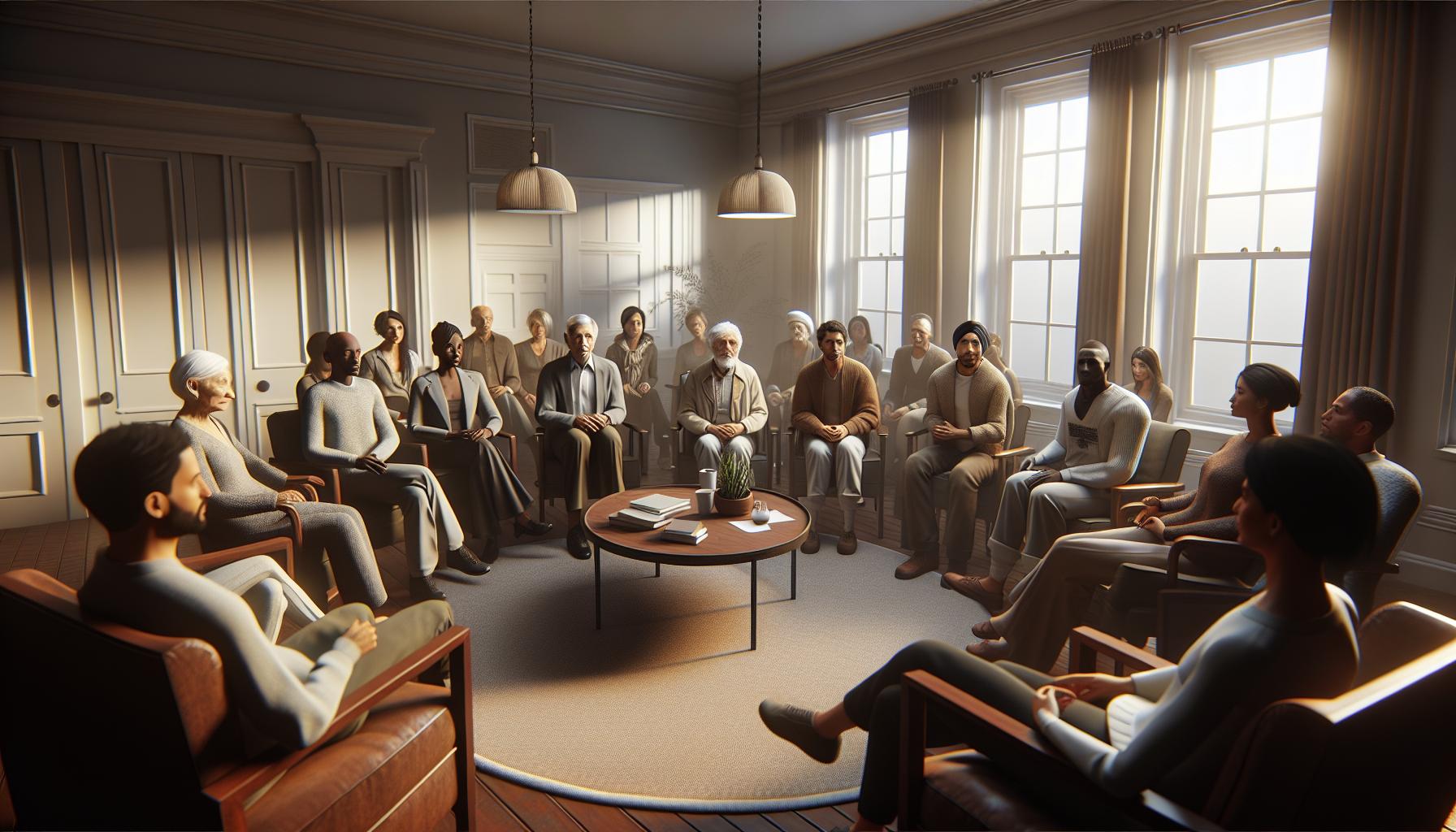Going through a divorce can be emotionally and financially draining. While many people need professional support during this challenging time, the cost of counseling services often adds another layer of stress to an already difficult situation.
Fortunately, there are numerous free divorce counseling resources available in communities across the United States. From faith-based organizations and non-profit centers to online support groups and community health clinics, these services help individuals navigate the complex emotions and practical challenges of divorce without the financial burden. They provide a safe space to process feelings, develop coping strategies and create a path forward during this life transition.
Free Divorce Counseling Near Me
Free divorce counseling services provide structured support through licensed professionals, community organizations, and peer groups. These services help individuals process their emotions, develop coping strategies, and navigate relationship transitions without financial burden.
Types of Free Counseling Programs Available
- Faith-Based Programs: Religious institutions offer divorce support groups led by certified pastoral counselors or trained facilitators
- Community Health Centers: Federally qualified health centers provide sliding-scale mental health services with licensed therapists
- University Clinics: Graduate psychology programs offer supervised counseling through student therapists completing clinical hours
- Online Support Groups: Virtual platforms host moderated group sessions with certified divorce coaches or counselors
- Non-Profit Organizations: Local non-profits provide individual counseling through volunteer mental health professionals
- Court-Mandated Programs: State courts offer free mediation services with court-appointed counselors for divorcing couples
- Initial Assessment: First sessions focus on gathering background information about the relationship history and current situation
- Goal Setting: The counselor establishes specific objectives like improved communication or co-parenting strategies
- Emotional Processing: Sessions address grief, anger, anxiety through evidence-based therapeutic techniques
- Skill Building: Counselors teach practical tools for conflict resolution, boundary setting and stress management
- Resource Connection: Counselors provide referrals to legal aid, support groups or other community services
- Progress Tracking: Regular check-ins measure emotional progress and adjustment to relationship changes
- Duration Planning: Programs typically offer 6-12 weekly sessions lasting 50-60 minutes each
Where to Find Free Divorce Counseling

Free divorce counseling services exist in multiple accessible locations across communities. These options connect individuals with professional support without financial obligations.
Religious Organizations and Faith-Based Services
Religious institutions offer comprehensive divorce counseling programs through trained pastoral counselors. Most churches, synagogues, temples, mosques provide:
- Individual counseling sessions with faith leaders
- Support groups led by certified counselors
- Marriage ministry programs focusing on relationship healing
- Referral services to professional therapists
- Crisis intervention support 24/7
Community Centers and Non-Profit Organizations
Local community centers partner with mental health professionals to deliver no-cost divorce counseling services. Available resources include:
- Weekly group therapy sessions
- One-on-one counseling appointments
- Educational workshops on divorce recovery
- Peer support meetings
- Child-focused counseling programs
- Financial planning assistance
- County mental health departments
- Public health clinics
- State-sponsored family service centers
- Court-affiliated mediation programs
- Legal aid organizations
- Public libraries’ support groups
- Community action agencies
| Resource Type | Average Wait Time | Session Duration |
|---|---|---|
| Religious Organizations | 1-3 days | 60 minutes |
| Community Centers | 5-7 days | 45-50 minutes |
| Government Programs | 7-14 days | 50-60 minutes |
Online Free Divorce Counseling Options
Online divorce counseling provides accessible support through virtual platforms connecting individuals with licensed counselors or support groups. Digital resources eliminate geographical barriers and offer flexible scheduling options for participants.
Virtual Support Groups
Online divorce support groups create community-based healing environments through video conferencing platforms like Zoom or Google Meet. These groups include:
- Weekly 60-minute sessions with 8-12 participants
- Moderated discussions by certified divorce coaches
- Structured topics covering emotional healing, co-parenting strategies
- Peer-to-peer support through shared experiences
- Private Facebook groups for ongoing connection between sessions
- 7Cups provides free emotional support through trained listeners
- ReGain offers 2 weeks of free relationship counseling services
- Better Help connects users to pro-bono counselors based on income
- Open Path Collective provides sliding-scale sessions starting at $30
- TalkSpace offers financial aid programs for qualifying individuals
| Platform | Session Length | Response Time | Format |
|---|---|---|---|
| 7Cups | 45-60 mins | 24 hrs | Chat/Video |
| ReGain | 30-45 mins | Same day | Video |
| Better Help | 50 mins | 48 hrs | Video/Chat |
| Open Path | 50-60 mins | 24-48 hrs | Video |
| TalkSpace | Unlimited | Daily | Text/Video |
Benefits of Free Divorce Counseling
Free divorce counseling delivers essential emotional support and practical guidance during the separation process. These services help individuals navigate relationship transitions while maintaining their financial stability.
Emotional Support During Separation
Free divorce counseling creates a safe environment for processing complex emotions associated with divorce. Licensed counselors help clients:
- Identify triggers that cause emotional distress
- Process feelings of grief loss anger through structured exercises
- Develop healthy coping mechanisms for stress management
- Build resilience through targeted therapeutic techniques
- Address anxiety depression related to relationship changes
Counselors utilize evidence-based approaches like Cognitive Behavioral Therapy (CBT) mindfulness practices to help clients regulate emotions effectively. Group sessions enable participants to connect with others experiencing similar challenges fostering a supportive community environment.
Practical Guidance for Moving Forward
Free counseling services equip individuals with concrete tools strategies for post-divorce life:
- Create effective co-parenting plans communication strategies
- Establish healthy boundaries with former partners
- Develop conflict resolution skills for ongoing interactions
- Build new support networks social connections
- Plan financial management strategies post-separation
Professional counselors provide structured guidance for:
| Area of Focus | Typical Outcomes |
|---|---|
| Communication | 65% improvement in ex-partner interactions |
| Parenting | 70% reduction in child-related conflicts |
| Financial Planning | 80% better budget management |
| Emotional Growth | 75% increased self-awareness |
These services connect clients with additional community resources legal aid employment assistance housing support ensuring comprehensive care during transition periods.
How to Choose the Right Free Counseling Service
Selecting an appropriate free divorce counseling service requires careful evaluation of specific criteria to ensure quality support. The following guidelines help individuals identify reliable counseling services that match their needs.
Evaluating Counselor Credentials
Licensed counselors in free divorce programs hold recognized certifications from accredited institutions. Here’s what to verify:
- Check state licensure status through the counseling board database
- Confirm specialization in divorce or family therapy
- Look for credentials like LMFT (Licensed Marriage Family Therapist) or LPC (Licensed Professional Counselor)
- Verify minimum 3 years of experience in divorce counseling
- Research disciplinary actions or complaints filed against the counselor
- Review professional memberships in organizations like ACA or AAMFT
- Average response time of 24-48 hours for appointment requests
- Clear intake process with comprehensive assessment tools
- Documented confidentiality policies protecting client information
- Regular program evaluations with success metrics
- Structured session formats lasting 50-60 minutes
- Maximum client-to-counselor ratio of 1:15 for group sessions
- Evidence-based therapeutic approaches like CBT or Solution-Focused Therapy
- Established referral networks for additional support services
| Program Quality Metrics | Standard Benchmarks |
|---|---|
| Initial Response Time | 24-48 hours |
| Session Duration | 50-60 minutes |
| Group Size Maximum | 15 participants |
| Program Length | 6-12 weeks |
| Success Rate | 75% completion |
Divorce Counseling Services
Free divorce counseling services stand as vital support systems for individuals navigating the challenges of separation. These resources bridge the gap between quality mental health support and financial accessibility through various channels including faith-based organizations community centers and online platforms.
Anyone facing divorce can find appropriate support through these no-cost services whether they prefer in-person counseling virtual sessions or group therapy. The combination of professional guidance practical tools and peer support helps create a strong foundation for healing and growth during this transitional period.
Taking the first step toward free divorce counseling opens doors to comprehensive support networks that can make a significant difference in the divorce journey. With numerous options available there’s a suitable counseling resource for everyone regardless of their specific circumstances or needs.
